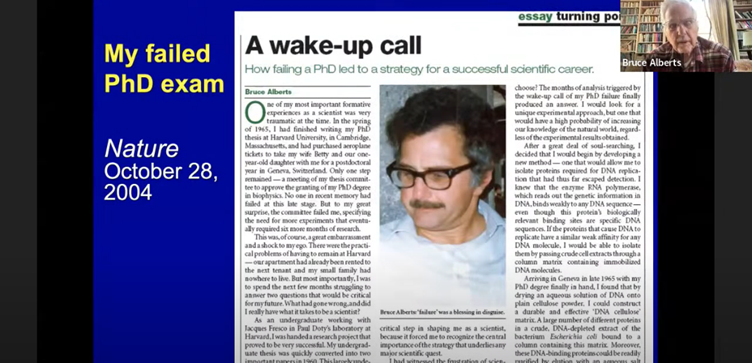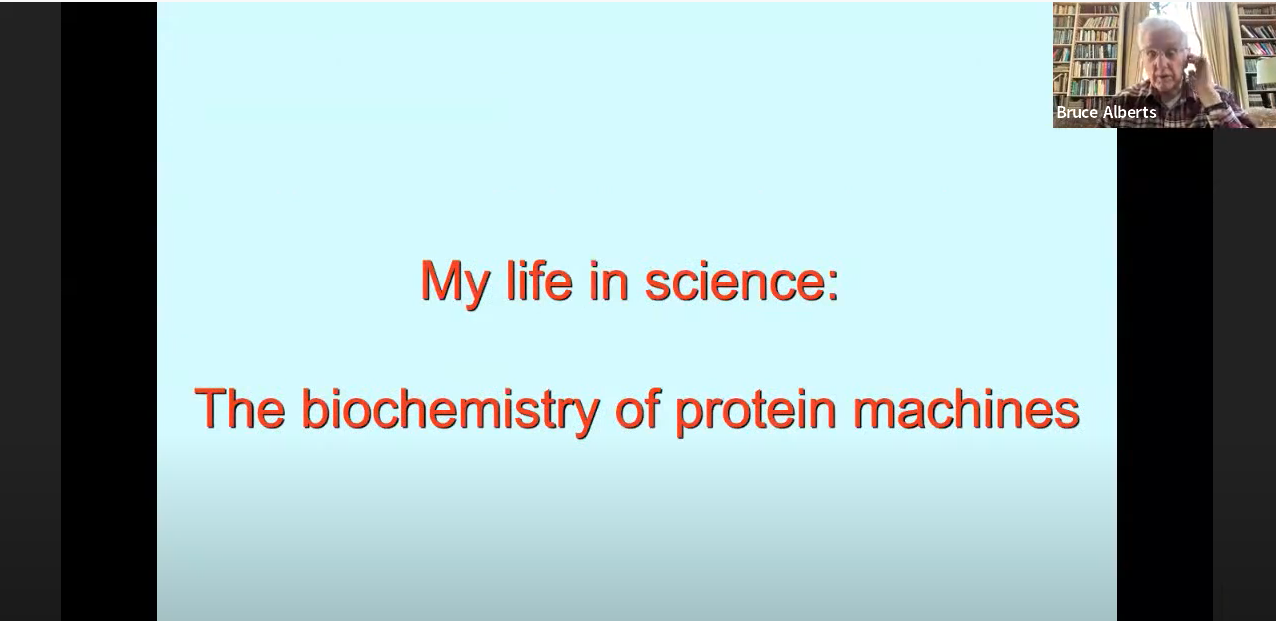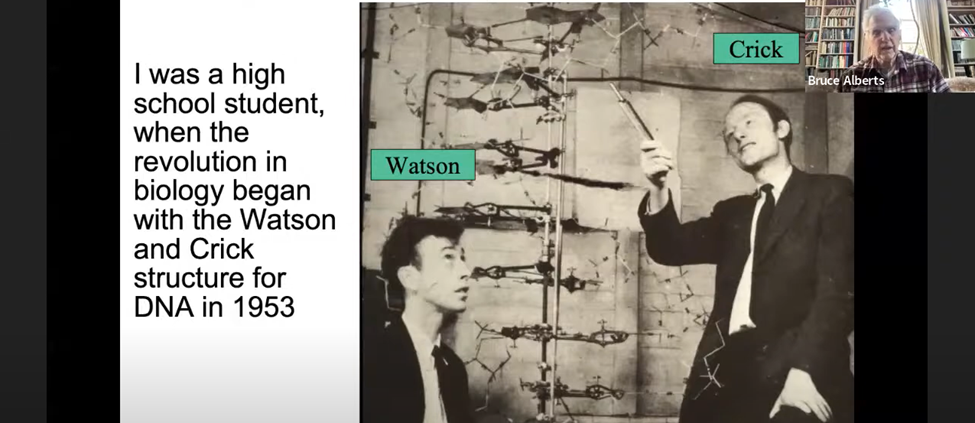After the event ‘Week with Nobel Prize Winners’ and a lecture by Dr. William G. Kaelin, winner of the Nobel Prize in Physiology or Medicine in 2019, and Professor Dr. Andrew Fire, who, along with Craig C. Mello, won the 2006 Nobel Prize in Physiology or Medicine on the topic ‘Why is science like fishing and why should we never give up?’,
scholarship holders of Hemofarm Foundation attended a lecture by Dr. Bruce Alberts, one of the most successful cell biologists of today and author of the world's most famous and recognized textbook in the field of molecular biology entitled ‘Molecular Biology of the Cell’.
Dr. Bruce Alberts holds a degree in biochemistry and a PhD in biophysics from Harvard University. The curiosity is that he failed his first doctoral exam. He later stated that his initial unpleasant experience taught him more than any subsequent success he had achieved.

His career has been marked by the study of chromosome-replicating protein complexes when living cells divide and a strong commitment to advancing science and math education to dramatically change education at all levels, focusing on transferring scientific habits to all students, including the demand for evidence in making personal judgments and respecting and understanding the scientific endeavor.
SOME LESSONS FROM LIFE IN SCIENCE
During a lecture to Hemofarm Foundation scholarship holders and members of the Serbian Society for Molecular Biology on ’Some Lessons from Life in Science’, Dr. Alberts shared his rich experience of over sixty years in science and especially pointed out to future scientists the importance of endeavors that may fail at first but from which the most can be learned.

After Dr. Alberts' presentation, students had the opportunity to ask questions and discuss with him various topics related to personal and professional development. We bring you the impressions of the Hemofarm Foundation scholarship holders who state that, in addition to their professional orientations, the lecture helped them to look at some of their ‘failures’ from a completely different perspective.
FIRST MEETING WITH WORLD-RENOWNED AND SUCCESSFUL SCIENTISTS
‘This lecture, together with the last two, given by the Nobel laureates, was my first opportunity to meet with world-renowned and successful scientists. I was glad that scientists of this caliber openly and selflessly share their views and the essence of their thoughts. Presenting his mistakes and successes while working on books and scientific papers, Dr. Bruce Alberts emphasized in his lecture how important it is to approach every scientific paper with a well-thought-out structure that, above all, implies a reasonable, important subject of study, and that we should never find ourselves in a situation where we are engaged in scientific work only for the sake of scientific work. Together, we discussed how teaching could be adapted, already in the initial courses at the faculties, in order to teach students scientific approach and thinking, instead of the current focus on facts and concepts that are taken as absolute,’ said Milica Dikovic from the Faculty of Technology and Metallurgy in Belgrade, Department of Biochemical Engineering and Biotechnology.
EVERY CRISIS CAN BE OVERCOME WITH WORK, INTEREST AND PATIENCE
‘I really enjoyed Dr. Bruce Alberts' lecture. Before getting acquainted with his scientific achievements (protein machine, scaffolds), he briefly presented the previous knowledge of his older colleagues - Crick and Watson, to better understand the entire topic and the functioning of DNA molecules, replication and many cause-and-effect relationships. In addition to numerous expert knowledge in molecular biology, Dr. Alberts pointed out two important directions in science: learning from failure, as a crucial role in scientific strategy, and careful study of all previous knowledge from the scientific literature. He also shared with us his ‘problems’ from his student days, assuring us that ‘everyone can have a failure and a crisis, but that with work, interest and patience, everything can be overcome,’ said Milica Probojčević from the Faculty of Technology, University of Novi Sad, Department of Pharmaceutical Engineering.
 I WAS THRILLED BY THE LECTURE OF DR ALBERTS
I WAS THRILLED BY THE LECTURE OF DR ALBERTS
‘It has been a great honour for me to have had the opportunity to attend the lecture of such a worldly man with a great sense of humor. Although I am not particularly familiar with molecular biology field of science, it has not been a setback for me to understand the messages from the stories of Dr Bruce Alberts that he tried to convey to all of us.
I was fascinated by the fact that he was committed for 30 years to solving a certain problem related to DNA, inspired by the work of James. D. Watson and Francis Creek but guided by inaccurate facts. When he finally came up with a theoretical solution, after conducting a number of experiments to prove it, he initially failed in defending his doctoral thesis, which entailed various problems, primarily of personal nature. I read the ‘History of Greek Philosophy’ the other day, and all that reminded me of Carl Raymond's thought: ‘A claim can be considered scientifically proven if it is rebuttable in principle, i.e. if its erroneous can be demonstrated in principle. The claims that are not such, do not belong to science but to metaphysics’. It occurred to me: ‘So, this is called science.’ Dr Bruce Alberts advised us that the most important thing was to develop a good strategy in both life and when preparing a scientific-research paper, because, as he said, his biggest mistake was that he had not read the literature thoroughly. It is encouraging that scientists like him are aware of the diversity of interests and attach importance also to experts from the socio-cultural and political spheres, believing that these people can understand and pass on the science they create.’ – Emilija Stankijević, University of Novi Sad, Faculty of Technical Sciences, Industrial Engineering Department.
You can watch the video from Dr. Bruce Alberts' lecture
HERE.
Dr. Bruce Alberts is the winner of numerous awards for his contribution to science and scientific education. Former US President Barack Obama presented him with the National Medal of Science in 2014, and in 2016 he received the Lasker-Koshland Award for special achievements in medical sciences. He was president of the National Academy of Sciences in Washington for two terms and editor-in-chief of the journal ‘Science’.
Dr. Bruce Alberts' lecture entitled ‘Some Lessons from Life in Science’ took place thanks to the cooperation with the Serbian Society for Molecular Biology. This cooperation refers to the field of molecular biology and pharmacy through the organization of various lectures, workshops and events for students of Hemofarm Foundation, but also the provision of professional lecturers and mentors of the company Hemofarm AD. for lectures in the field of pharmacy for students of molecular biology with a visit to Hemofarm's production plant in Vršac.